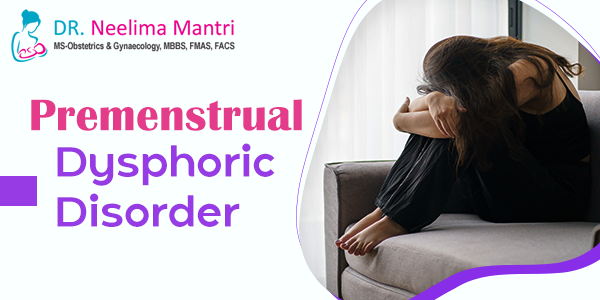Pain and discomfort, fatigue, mood swings, stress, sleep disturbances, and interpersonal challenges – PMS can trouble women a lot with its combinations of physical and emotional symptoms.
Premenstrual Dysphoric Disorder is a severe form of PMS that can cause more intense and extreme forms of physical and emotional symptoms triggered by PMS. It is estimated that 8-10% of women of reproductive age can succumb to this painful transition that can impair their quality of life and wreak havoc in the days that lead up to menstruation.
But what is Premenstrual Dysphoric Disorder, what causes it, and how is this condition treated in women? With inputs from a leading gynaecologist in Mumbai, Dr. Neelima Mantri, let us find answers to these questions in this blog today.
What is Premenstrual Dysphoric Disorder?
Premenstrual Dysphoric Disorder (PMDD) is a severe form of premenstrual syndrome (PMS), characterized by intense physical and emotional symptoms that significantly interfere with the daily life of women. Unlike PMS, it is a chronic condition that manifests in the week or two before menstruation.
Unfortunately PMDD is becoming increasingly common, affecting as much as 10% of women of reproductive age. It is a severe condition that requires immediate attention from medical professionals specializing in treating Premenstrual Disorders.
Premenstrual Dysphoric Disorder – Causes and Symptoms:
Unfortunately, the exact cause of PMDD is not known. It is still considered an anomaly and an abnormal reaction of the body to the hormonal changes that happen during menstruation. However, certain risk factors have been identified to increase the risk of PMDD, including:
- History of PMS
- Underlying anxiety or depression.
- Family history of mood disorders or PMDD
- Personal history of abuse, trauma, or other highly stressful events.
PMDD can trigger a whole host of physical and emotional symptoms that are best described as a severe version of PMS. The symptoms can be versatile and vary from case to case; in general, the symptoms of PMDD include the following:
Psychological Symptoms: Severe fatigue, anxiety, agitation, forgetfulness, insomnia, paranoia, moodiness, concentration problems, confusion, lack of control, nervousness, crying spells, anger, irritability, and depression.
Neurological and Vascular Problems: Muscle spasms, dizziness, numbness, prickling, tingling, or heightened sensitivity of arms and legs, easy bruising, fainting, headache, and heart palpitations.
Skin Problems: Acne, skin inflammation, and other skin disorders.
Other Problems: Decreased sex drive, painful menstruation, food cravings, hot flashes, tender breasts, allergies, and appetite changes.
Premenstrual Dysphoric Disorder – Treatment
All the above symptoms hitting women in their most severe form can cause extreme emotional and physical distress to women. Fortunately, PMDD can be managed and treated by qualified gynaecologists, and the risk of occurrence can be drastically cut down with the proper measures.
“The treatment for PMDD usually involves Antidepressants, Hormonal birth control pills, Dietary changes, OTC medications, regular exercise, stress management, and lifestyle changes. When perfectly tailored for a specific case, these options together can help manage and treat PMDD successfully,” says leading lady gynaecologist in Mumbai specializing in PMDD treatment, Dr. Neelima Mantri. For more information on the treatment of Premenstrual Dysphoric Disorder, you can directly consult her here.



